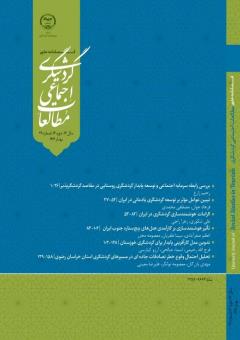تدوین مدل کارآفرینی پایدار برای گردشگری خوزستان
محورهای موضوعی :
فرج اله رحیمی
1
![]() ,
اسماء صالحی
2
,
اسماء صالحی
2
![]() ,
آرزو کیارسی
3
,
آرزو کیارسی
3
![]()
1 - دانشیار گروه مدیریت، دانشکده اقتصاد و علوم اجتماعی، دانشگاه شهید چمران اهواز، اهواز، ایران
2 - دانش آموخته کارشناسی ارشد رشته مدیریت بازرگانی، دانشکده اقتصاد و علوم اجتماعی، دانشگاه شهید چمران اهواز، اهواز، ایران
3 - مدرس دانشگاه جامع علمی کاربردی استان خوزستان، اهواز، ایران
کلید واژه: پایداری, کارآفرینی پایدار, گردشگری, نظریهپردازی دادهبنیاد,
چکیده مقاله :
گردشگری بهعنوان یک صنعت پیشرو و پر رونق در دنیای امروزی است که میتواند در همه کشورها بهویژه کشورهای کمتر توسعهیافته آثار مثبت بسیاری در پاسخ به چالشهایی از جمله فقر، بیکاری، مهاجرت، نابرابری و حتی تخریب زیستمحیطی به همراه داشته باشد. از اینرو توسعه کارآفرینی در صنعت گردشگری و در چارچوب پایداری اهمیت مییابد. این مقاله مبتنی بر پژوهش کیفی است که با استفاده از استراتژی نظریهپردازی دادهبنیاد به طراحی مدل کارآفرینی پایدار در صنعت گردشگری میپردازد. بههمین منظور به روش نمونهگیری نظری که غیرتصادفی بوده و تا زمان اشباع کامل دادهها ادامه پیدا کرده است، با ۲۴ تن از مدیران و خبرگان کارآفرینی و گردشگری استان خوزستان، به صورت نیمهساختاریافته مصاحبه انجام شد و متون مصاحبه در سه مرحله کدگذاری باز، محوری و انتخابی مورد تحلیل قرار گرفت. مدل پس از طراحی به روش دلفی مورد ارزیابی مصاحبه شوندگان قرار گرفت و به جهت بررسی اجماع، پرسشنامهای بسته طراحی شد که پس از تکمیل آن توسط مشارکتکنندگان، ضریب هماهنگی کِندال از طریق نرمافزار اِسپیاِساِس محاسبه و عدد ۰/۶۳۰ بهدست آمد که بیانگر اتفاق نظر و اتمام روش دلفی است. نتایج حاصل از این پژوهش برگرفته از 124مفهوم در قالب 18 مقوله و 6 مقوله محوری حاصل از مصاحبهها، مدلی را ارائه میدهد که به انگیزههای رویآوردن به کارآفرینی پایدار در گردشگری و عوامل مؤثر بر آن میپردازد و به کارآفرینان و سازمانها و کسبوکارهای مرتبط، در توسعه و ترویج موفقیتآمیز کارآفرینی پایدار، بهبود سطح اجتماعی مردم محلی، مراقبت از محیطزیست منطقه و حفظ منابع برای آیندگان کمک مینماید.
Tourism is recognized as a prominent and dynamic global industry with the potential to generate substantial positive impacts in all nations, particularly in less developed countries, by addressing challenges such as poverty, unemployment, migration, inequality, and even environmental degradation. Consequently, the sustainable development of entrepreneurship within the tourism sector assumes significant importance. In this regard, this qualitative study sought to develop a model of sustainable entrepreneurship within the tourism industry using the grounded theory method. To this end, the required data were collected through semi-structured interviews with 24 managers and experts in entrepreneurship and tourism in Khuzestan province, who were selected via theoretical sampling. The data collection continued until theoretical saturation was achieved. Then, the interview transcripts underwent a three-stage coding process: open, axial, and selective coding. The resultant model was subsequently evaluated by the interviewees using the Delphi method. To assess consensus, a closed-ended questionnaire was developed and administered to the participants, and Kendall's coefficient of concordance was calculated using SPSS software, yielding a value of 0.630, indicating a significant level of agreement and the completion of the Delphi process. The findings of the study, derived from 124 concepts organized into 18 categories and 6 core categories extracted from the interviews, propose a model that elucidates the motivations for engaging in sustainable entrepreneurship in tourism and the factors influencing it. This model offers valuable insights to entrepreneurs, organizations, and related businesses so that they are able to effectively develop and promote sustainable entrepreneurship, enhancing the social well-being of local communities, safeguarding the region's environment, and preserving resources for future generations.
